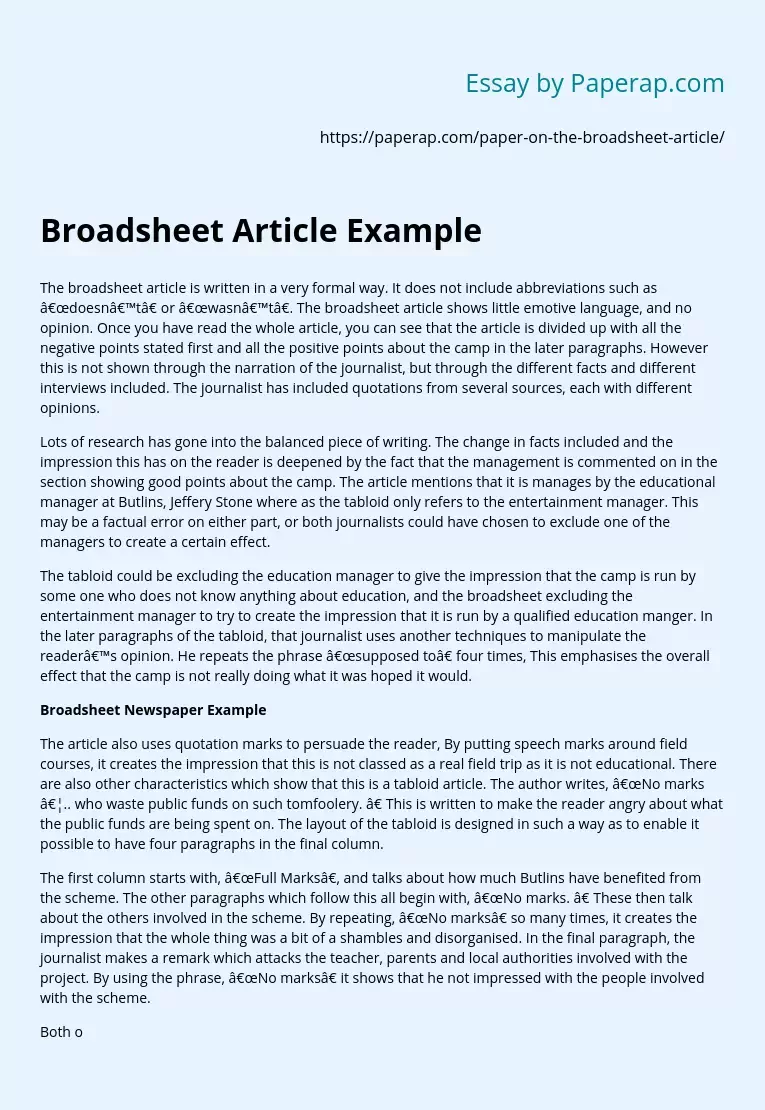Broadsheet Article Example
The broadsheet article is written in a very formal way. It does not include abbreviations such as “doesn’t” or “wasn’t”. The broadsheet article shows little emotive language, and no opinion. Once you have read the whole article, you can see that the article is divided up with all the negative points stated first and all the positive points about the camp in the later paragraphs. However this is not shown through the narration of the journalist, but through the different facts and different interviews included.
The journalist has included quotations from several sources, each with different opinions.
Lots of research has gone into the balanced piece of writing. The change in facts included and the impression this has on the reader is deepened by the fact that the management is commented on in the section showing good points about the camp. The article mentions that it is manages by the educational manager at Butlins, Jeffery Stone where as the tabloid only refers to the entertainment manager.
This may be a factual error on either part, or both journalists could have chosen to exclude one of the managers to create a certain effect.
The tabloid could be excluding the education manager to give the impression that the camp is run by some one who does not know anything about education, and the broadsheet excluding the entertainment manager to try to create the impression that it is run by a qualified education manger. In the later paragraphs of the tabloid, that journalist uses another techniques to manipulate the reader’s opinion.
He repeats the phrase “supposed to” four times, This emphasises the overall effect that the camp is not really doing what it was hoped it would.
Broadsheet Newspaper Example
The article also uses quotation marks to persuade the reader, By putting speech marks around field courses, it creates the impression that this is not classed as a real field trip as it is not educational. There are also other characteristics which show that this is a tabloid article. The author writes, “No marks ….. who waste public funds on such tomfoolery. ” This is written to make the reader angry about what the public funds are being spent on. The layout of the tabloid is designed in such a way as to enable it possible to have four paragraphs in the final column.
The first column starts with, “Full Marks”, and talks about how much Butlins have benefited from the scheme. The other paragraphs which follow this all begin with, “No marks. ” These then talk about the others involved in the scheme. By repeating, “No marks” so many times, it creates the impression that the whole thing was a bit of a shambles and disorganised. In the final paragraph, the journalist makes a remark which attacks the teacher, parents and local authorities involved with the project. By using the phrase, “No marks” it shows that he not impressed with the people involved with the scheme.
Both of the articles mention “Hi-di-hi”, The tabloid uses it in its headline, and the broadsheet in its final paragraph, however I do not feel that they are after the same effect. When it is read in context in the tabloid article, it is one of the first emotive words used. Word order is a common technique used in tabloid writing, and by placing it first, emphasis is placed on it. The Broadsheet places this as a joke at the end, and I feel that this has no meaning or depth, but is just simply a joke added in as a small light hearted piece of humour.
The newspapers are not written to rival each other. They are both targeted at different audiences. I think it is important to realise that the tabloid article was published several days before the broadsheet one, and therefore the broadsheet article journalist would have had more time to put his story together. I feel that the tabloid has written his article in the way he has and included the facts he has because he knows that he will sell more newspapers – the British public loves a scandal!
Broadsheet Article Example. (2019, Dec 05). Retrieved from https://paperap.com/paper-on-the-broadsheet-article/

